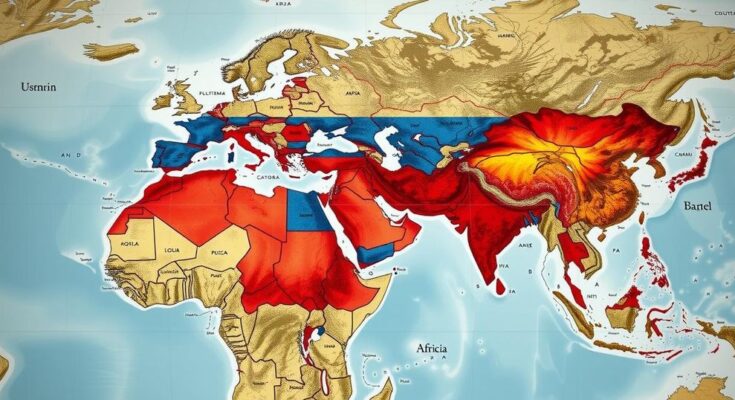The article discusses Russia’s declining influence as a power in Africa, highlighting military overreach, increased violence against civilians, and competition from other nations. Notable Russian military setbacks, such as losses in Mali, and the Kremlin’s weakening economic power challenge the narrative of Russia as a strong partner for African regimes. As countries like Mali reassess their alliances, the future of Russian engagement in Africa remains uncertain.
The perception that Russia holds substantial power in Africa is increasingly unfounded. Despite their initial successes in nations like Mali, where Russian mercenaries allegedly helped remove Western influence and stabilize regimes, the reality on the ground reveals diminished capacity and influence. Reports indicate that Moscow’s engagements often lead to considerable civilian casualties and a general deterioration in security. The recent deaths of Russian soldiers in Mali underscored the overstretched nature of Russia’s involvement, presenting a stark contrast to the Kremlin’s narrative of a great power supporting African liberation. As Russia grapples with its operations in Ukraine and the Middle East, its opportunities in Africa appear limited, leading to a reevaluation among African leaders regarding their reliance on Russian support, especially in light of competing offers from powers like Turkey.
Russia’s military actions in Africa have produced mixed results, complicating the Kremlin’s narrative of a benevolent power aiding African nations. While Moscow attempted to capitalize on anti-Western sentiment by supporting coups and providing mercenary forces, the ongoing violence and poor conditions in affected regions demonstrate the high cost of Russia’s involvement. In fact, as confidence in Russian protection wanes, countries that initially turned to Russia are exploring partnerships with different nations for security and development needs.
Furthermore, the Kremlin’s influence in Africa is threatened by the revelation of its military inadequacies and declining economic prospects. The sanctions regime affecting the Russian economy limits Moscow’s capability to offer genuine investment or humanitarian aid comparable to what Western nations can provide. Despite attempts at information warfare and propaganda deployment to bolster its image, the reality of the situation points to a diminishing Russian role as African nations reconsider their partnerships with marginalized regimes and fickle powers.
The article provides insight into the complexities of Russia’s involvement and perceived power in Africa. Initially, Russia leveraged anti-colonial sentiments and presented itself as a counterweight to Western powers by supporting military coups and engaging in disinformation campaigns. However, escalating violence, military losses, and diminishing economic support highlight the challenges Russia faces in maintaining its influence. The struggle for resources in Ukraine further complicates its ability to sustain operations in Africa, leading to shifts in alliances as African leaders seek stability and development from other sources.
In conclusion, Russia’s role as a great power in Africa is increasingly tenuous. Despite initial successes in establishing its presence through military engagements and regime support, recent developments indicate that Moscow’s influence is diminishing amid operational strains and serious questions about its capability to deliver meaningful assistance. The shift towards partnerships with other countries, particularly Turkey, signifies a critical reevaluation of diplomatic ties as African nations prioritize their own stability and security needs over loyalty to a potentially unreliable ally.
Original Source: foreignpolicy.com




